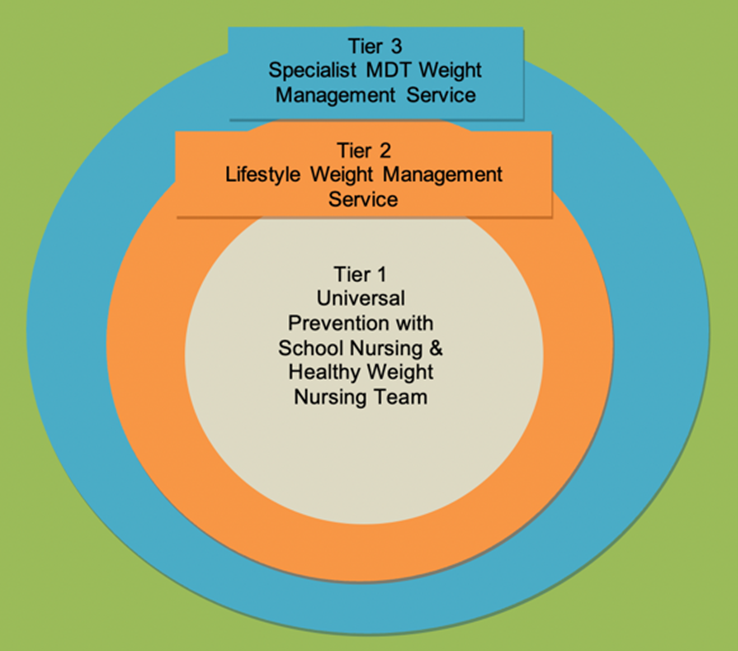Childhood obesity in the UK
In the UK, there has been a year-on-year increase in the rate of children living with or at high risk of obesity. The health impact may include joint pain, asthma or other breathing difficulties, high blood pressure and type 2 diabetes. The estimated spend on obesity-related complications in the NHS was £6.1 billion in 2014/15. It is projected to rise to £9.7 billion by 2050 (Public Health England, 2017).
All healthcare professionals have a duty in promoting healthier weight for children. To assess your own development needs, see the following competency framework at NHS England e-learning for healthcare: Healthier Weight Competency Framework.
A child living with obesity is likely to cross the path of many healthcare professionals across a range of healthcare services. However, many local areas lack funding for specialist services or are managing children in general services. The figure below depicts the tiers of childhood obesity-centred services in the UK.

The Shine Health Academy is a great example of a community based weight management programme (tier 2) that supports children aged 10-17. Specialist (tier 3) multidisciplinary team (MDT) clinics include the complications of excess weight (CEW) pilot clinics which are being run across England to identify the factors involved in severe obesity and treat their complications with individualised holistic plans. For further information on the CEW clinics click here.
Evidence-based practice
Evidence has shown multicomponent frameworks that address nutrition, physical activity and behaviour change are essential to childhood obesity management. For further detail on identification, assessment and management guidance, see the NICE Clinical Guideline for Obesity. This guideline explains which children require tier 1-3 services.
The British Dietetic Association Obesity Specialist Group have set out detailed dietetic information for the practice considerations of childhood obesity management which is an important read and can be accessed here. This guidance does not aim to make clinical recommendations but helps to describe the components of an ideal child weight management service. It also aims to facilitate areas of practice with limited or growing evidence. This is discussed in more detail in the Dietetic Resources section.
Further training
The NHS England Learning Hub has published a foundation level e-learning module on childhood obesity which has been developed by a multi-professional group of writers, led by dietitians from the BDA’s Obesity and Paediatric Specialist Groups. The aim of this module is to give everyone working with children and young people a crucial understanding of the biopsychosocial complexities of childhood obesity. The training is strongly recommended and can be accessed here.

